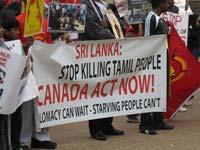Canada’s Tamil community mobilized to continue fight

With its huge population of Sri Lankan Tamils, Canada fears that resentment over the defeat of the Tamil Tigers last year may lead to violent response by sections of the 300,000-strong community in the country, says a report.
Canadian security agencies are worried that the Tamil anger could lead to backlash like the Air India bombing by Khalistanis in 1985 to avenge the army attack on the Golden Temple to flush out militants, says the report, according to the Hindustan Times.
Titled ‘The Sri Lankan Diaspora After The LTTE’, the report by Brussels-based International Crisis Group (ICG) says: “The Tigers humiliating defeat, the enormous death toll in the final months of the war and the internment of more than a quarter million Tamils (has) left the diaspora feeling powerless, betrayed by the West, demanding justice and, in some cases, wanting revenge.”
The report comes in the wake of an attack on a Tamil newspaper office in Toronto’s east end.
Logan Logandralingam, the editor of Uthayan, said he got an anonymous phone call Sunday morning from a man who told him to go to his office, where a “message” would be waiting for him.
Toronto police are investigating the incident, but Logandrahlingam told CBC News that he thinks the attack may have been a warning from people who are unhappy that some members of the Canada-Sri Lanka Business Council travelled to Sri Lanka to meet with President Mahinda Rajapaksa.
Most of the 300,000 Sri Lankan Tamils are concentrated in the Toronto area while about 8,000 tamils thousands live in the Greater Vancouver area.
Canada is now home to the largest Tamil population outside of Sri Lanka.
Despite the Tigers’ defeat in May last year, the Brussels report adds: “Most Tamils abroad remain profoundly committed to Tamil Eelam, the existence of a separate state in Sri Lanka. While there are no signals yet that the rump LTTE is planning a terrorist act, it only takes a handful of committed cadre in the diaspora bent on violence to have a deadly impact.”
According to the report, security officials in Canada are concerned over the repetition of something like the Air India bombing in June 1985 that led to 329 deaths.
“Canadian law enforcement officials have been concerned that, if left unchecked, LTTE activities could result in an event similar to the terrorist bombing of an Air India jet in 1985, which was planned and funded by Sikh separatists in Canada,” it says.
The report quotes a Canadian security official as saying: “We can’t ignore what is happening in our Tamil community, particularly the fundraising for (Tamil) Tigers. Because of what we learnt from Canada’s connection with Khalistan, we’re compelled to look at issues concerning the Tamil Tigers here because we don’t want another Air India disaster.”
The Asia Sentinel said only one group appears determined to continue the fight in Sri Lanka , and that is a large portion of the hundreds of thousands of Tamils overseas.
It said a series of privately funded referenda held in the Tamil communities in Norway, France, Canada, Germany, Switzerland, the Netherlands and Britain, to gauge support for an independent Tamil Eelam found that an overwhelming 99 percent were in favor of an independent country.
As the war continued to devastate the country since its start in 1983, hundreds of thousands of Tamils fled. Some 200,000 to 300,000 now live in Canada, 180,000 in the UK, 60,000 in Germany, 47,000 in Switzerland and 40,000 in Australia, with sizeable populations also in France, the Netherlands, the US, Italy, Malaysia, Denmark, New Zealand and Norway. There are smaller Tamil communities in South Africa, the Gulf States, and in several Southeast Asian countries as well.
During the 1990s Canada granted asylum to roughly 80 per cent of all Tamils who applied. Today the population in the greater Toronto area is the largest concentration of Tamils outside of Sri Lanka. Community organizations formed in the 1980s and 1990s to assist new immigrants with the resettlement process have allowed significant communities to grow and prosper, and they continue to pour money into the process, the report states.









